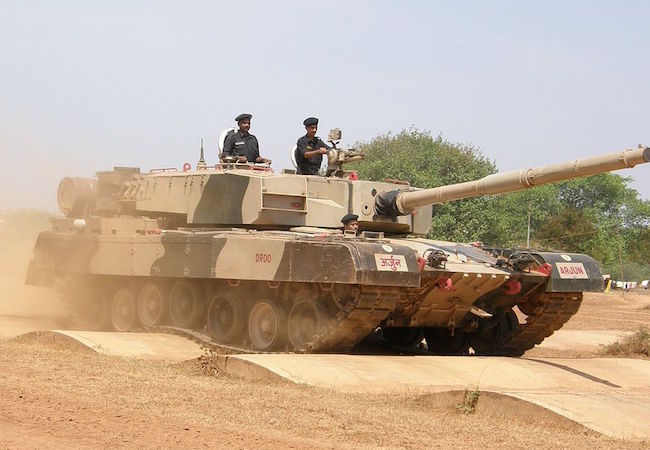
By Zahid Khan
Indian Army Chief, Gen.V.K. Singh, developed a military doctrine known as Cold-Start Doctrine [CSD] for employ in a potential war with Pakistan. It is a part of cohesive battle groups— it entails the numerous sections of India’s military conducting offensive operations. CSD is planned to permit India’s conventional forces to carry out holding assaults in order to thwart a nuclear retaliation from Pakistan in case of a clash—this doctrine also improved the Network Centric Warfare [NCW] capabilities. The doctrine was designed to rebuke Pakistan in a limited mode without triggering nuclear-retaliation. The menace of the Cold-Start doctrine and growth in Indian Defense Budget from $24 to $40 Billion has apparently provoked the Pakistan government to stridently boost its defense budget to 32 percent. Pakistan views India’s cold start doctrine as a real threat to its security and is unwilling to give up the defensive mechanism it has built to counter this threat, Z.N. Jaspal stated in [ISSI] Institute of Strategic Studies Islamabad.
The former Army Chief, Gen. Kapoor, squeezed over five key pillars of the Cold Start Doctrine—First, it must be prepared to face a two front war creating balance in its army command at both western as well north-eastern border—Second, the Indian army should enhanced the military and non military aspects in strategically combating the war counting measures to deal with WMDs from sub-conventional warfare, electronic and information warfare, cyber warfare,—Third, the Indian Army should have adequate military potency to take war into the enemy’s territory and defend India’s geo-political interests in order to shielding the littoral-states in the Indian Ocean Region [IOR]—Fourth, enhanced inter-dependence among the 03 branches of services, i.e., Army, Air force, and Naval—Fifth, technological development is the serious factor for India incorporating electronic warfare. The CSD intents at creation the land invasion into Pakistan’s territory through frontward mobilization of 08 integrated battle groups [IBG’s] with the bolster of Navy and Air-force in expediting Indian army to carry out the tactical maneuvers within 72 to 96 hours.
Asian Defense News reported, that the Indians boost up various forms of war-fare that have been dissident in nature and severe economic outcome as well as massive destabilization and chaos in Pakistan—initially, The goal has been to feeble Pakistan’s capabilities, outset with economic slowdown to gradually bring it to a stand-still, and also creating chaos in the society through in-discriminate bombings of civilian targets—this was done through paid for vendors and outsourcing it to the Tehrik-e-Taliban Pakistan and the Baloch Liberation Front. These have brought about the desired result at a much faster pace than expected. The Cold Start smack that the Indians initiated with the military formations within stone- throw away from the Pakistani-border created the unbeaten trick that the Indians have managed to continue for many years.
Pakistan today Islamabad Bureau stated, In October 2013, India exposed a spy military intelligence unit, called the Technical Services Division [TSD], which had been shaped by VK Singh, a former Indian Army Chief General. Further, Pakistani officials also pointed-out to the Indian intelligence agency, Research Analysis Wing [RAW] involvement in launching militancy in Baluchistan by abundantly enduring financial and weapons support to the few Balouch militant groups—these include the Balouchistan Liberation Army [BLA], Balouch Republican Army [BRA] and Balouchistan Liberation Front [BRF]. The intelligence agencies claim these militant outfits as separatist groups are acting on behalf of external forces and training camps which have been administered by RAW since 2006.
In January 2015, Plenty of dossier presented to the top US officials during a visit to Washington by Pakistan’s Chief of Army Staff General Raheel Sharif, which exposed the RAW involvement in provocative and supporting militancy in Baluchistan regions using Afghan soil, Geo TV reported. Some critics even go to the level of saying that RAW have not only been exporting the terrorism to Pakistan, they have also been training militants in the Tibet region from where they force them to cause instability in China. The US has always encouraged a working relationship between Afghanistan and Pakistan in counter-terrorism—with the NDS-ISI deal in place along with China’s full backing, a Sino-Afghan-Pak entente in regional security would certainly be detrimental to US interests in the region.
Pakistani Security arrested the Kulbhushan Yadav–alias Hussein Mubarak Patel, an agent of Research Analysis Wing in the region of Chaman, Baluchistan—the arrested Indian intelligence agent personifies counter terror policy of A.K. Doval, an Indian National Security Advisor and a prominent spy-master—Facts of the case remain that the man was found living with his wife, a son and a daughter with a genuine Indian passport but with a fake name, Hussein Mubarak Patel. Moreover, he was in possession of multiple identities.
Pakistan intelligence substantiated that the K. Yadhav was operating a terrorist financing and training network and used to execute from Chabahar in Iran, Makran in Pakistan and adjoining districts of Afghanistan, Express Tribune reported—His task was to initiate a string of subversive activities on the Makran coast where not only Chinese are working on Gwadar port but Pakistan Navy and Air Force also have multiple services. Pakistan officials have said the man was a serving Indian navy officer and was trying to sponsor terrorism in Balochistan. If an intelligence or an armed forces officer of this rank is arrested in another country, it is a big achievement, Lieutenant General, DG. ISPR, Mr. Asim Bajwa said.
A Frontier Corps [FC] spokesman said—raid on a compound in Boghra, a residential and commercial area in Chaman, and picked up an agent working for the National Directorate Security [NDS]—Plent of explosive materials, detonators, primacords, bombs and fuses recovered from the suspected agent’s possession—further, spy was supplying explosive materials and weapons for terrorist activities inside Balochistan. Intelligence agencies are interrogating the agent, he added. The arrest comes just weeks after forces arrested Kulbushan Yadhav, an Indian agent from Balochistan, who involved in terror activities in the province.




